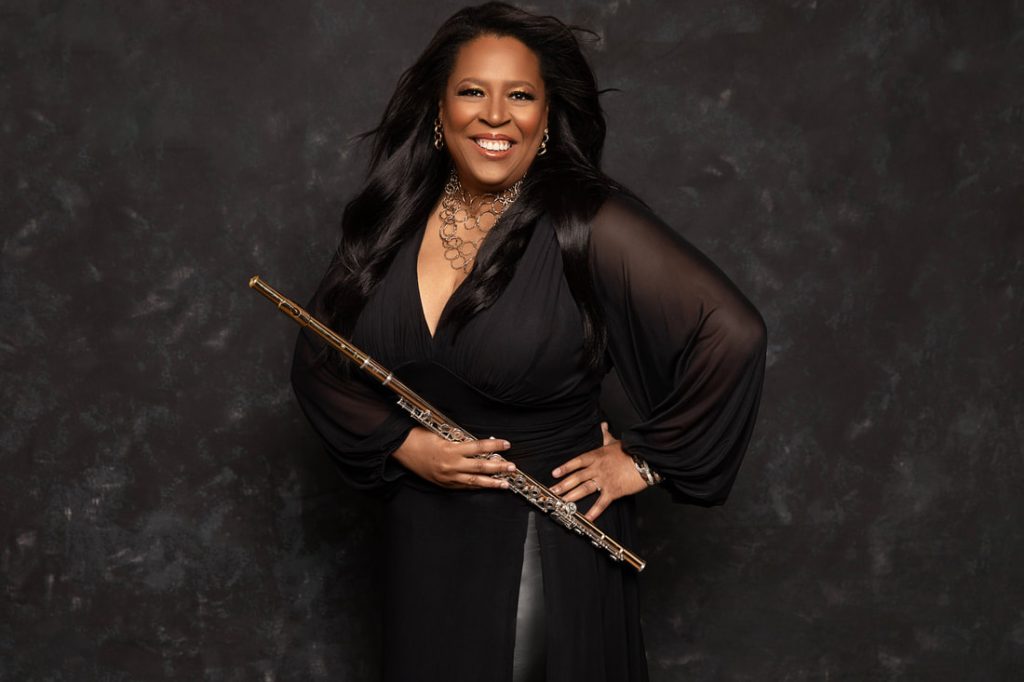Valerie Coleman

About the music
In its original form, Umoja, the Swahili word for Unity and the first principle of the African Diaspora holiday Kwanzaa, was composed a simple song for women’s choir. It embodied a sense of ‘tribal unity’, through the feel of a drum circle, the sharing of history through traditional “call and response” form and the repetition of a memorable sing-song melody. It was rearranged into woodwind quintet form during the genesis of Coleman’s chamber music ensemble, Imani Winds, with the intent of providing an anthem that celebrated the diverse heritages of the ensemble itself.
Almost two decades later from the original, the orchestral version brings an expansion and sophistication to the short and sweet melody, beginning with sustained ethereal passages that float and shift from a bowed vibraphone, supporting the introduction of the melody by solo violin. Here the melody is a sweetly singing in its simplest form with an earnest reminiscent of Appalachian style music. From there, the melody dances and weaves throughout the instrument families, interrupted by dissonant viewpoints led by the brass and percussion sections, which represent the clash of injustices, racism and hate that threatens to gain a foothold in the world today. Spiky textures turn into an aggressive exchange between upper woodwinds and percussion, before a return to the melody as a gentle reminder of kindness and humanity. Through the brass led ensemble tutti, the journey ends with a bold call of unity that harkens back to the original anthem. Umoja has seen the seen the creation of many versions, that are like siblings to one another, similar in many ways, but each with a unique voice that is informed by Coleman’s ever evolving creativity and perspective.
“This version honors the simple melody that ever was, but is now a full exploration into the meaning of freedom and unity. Now more than ever, Umoja has to ring as a strong and beautiful anthem for the world we live in today.”
About valerie coleman
Valerie Coleman is regarded by many as an iconic artist who continues to pave her own unique path as a composer, GRAMMY®-nominated flutist, and entrepreneur. Highlighted as one of the “Top 35 Women Composers” by The Washington Post, she was named Performance Today’s 2020 Classical Woman of the Year, an honor bestowed to an individual who has made a significant contribution to classical music as a performer, composer or educator. Her works have garnered awards such as the MAPFund, ASCAP Honors Award, Chamber Music America’s Classical Commissioning Program, Herb Alpert Ragdale Residency Award, and nominations from The American Academy of Arts and Letters and United States Artists. Umoja, Anthem for Unity was chosen by Chamber Music America as one of the “Top 101 Great American Ensemble Works” and is now a staple of woodwind literature.
In October 2021, Carnegie Hall presented her work Seven O’Clock Shout, commissioned by The Philadelphia Orchestra, in their Opening Night Gala concert featuring The Philadelphia Orchestra and Yannick Nézet-Séguin. This follows on the success of the world premiere of Coleman’s orchestral arrangement of her work Umoja, commissioned by The Philadelphia Orchestra and performed in Philadelphia and at Carnegie Hall in 2019, marking the first time the orchestra performed a classical work by a living female African-American composer. In February 2022, The Philadelphia Orchestra and soprano Angel Blue, led by Nézet-Séguin, gave the world premiere of a new song cycle written by Coleman, commissioned by the orchestra for performances in Philadelphia and at Carnegie Hall.
Former flutist of the Imani Winds, Coleman is the creator and founder of this acclaimed ensemble whose 24-year legacy is documented and featured in a dedicated exhibit at the Smithsonian National Museum of African American History and Culture in Washington, D.C. Along with composer-harpist Hannah Lash, and composer-violist Nokuthula Ngwenyama, she co-founded and currently performs as flutist of the performer-composer trio Umama Womama.
Coleman’s work as a recording artist includes an extensive discography. With Imani Winds, she has appeared on Sony Classical, Deutsche Grammophon, Sony Classical, Naxos, Cedille Records and eOne, and as a guest flutist on albums with Wayne Shorter Quartet, Steve Coleman and the Council of Balance, Chick Corea, Brubeck Brothers, Edward Simon, Bruce Adolphe, and Mohammed Fairouz. Her compositions and performances are regularly broadcast on NPR, WNYC, WQXR, Minnesota Public Radio, Sirius XM, Radio France, Australian Broadcast Company and Radio New Zealand.
Committed to arts education, entrepreneurship and chamber music advocacy, Coleman created the Imani Winds Chamber Music Festival in 2011, a summer mentorship program in New York City welcoming young leaders from over 100 international institutions. She has held flute and chamber music masterclasses at institutions in 49 states and over five continents, including The Juilliard School, Curtis Institute, Manhattan School of Music, Mannes College of Music, New England Conservatory, Oberlin College, Eastman School of Music, Yale University, Carnegie Mellon, Interlochen Arts Academy, Beijing Conservatory, Brazil’s Campo do Jordão Festival and Australia’s Musica Viva. As a part of Imani Winds, she has been artist-in-residence at Mannes College of Music, Banff Chamber Music Intensive and Visiting Faculty at the University of Chicago.
Coleman’s compositions are published by Theodore Presser and her own company, VColeman Music. She studied composition with Martin Amlin and Randy Wolfe and flute with Julius Baker, Judith Mendenhall, Doriot Dwyer, Leone Buyse and Alan Weiss. She and her family are based in New York City. (valeriecoleman.com)

Published by